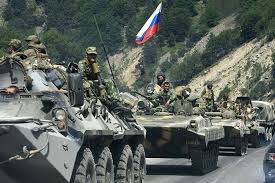Why You Should Care About The Russian Missile Strikes In Syria

November 2, 2015
I’m personally a huge fan of current events and history. Despite my young age, I’m fascinated by the world outside and within our borders and how they affect us.
For the average teenager, your concerns with politics may go as far as gun control, racism, and the presidential election and this is based on usually above average knowledge.
Too often, around school I am faced with that soul crushing statement of “I don’t really care,” or “This really doesn’t affect me. Why care about depressing politics and history?”
Questions like that always make me pause. There is no easy answer to it, or at least none that our generation’s short attention span is willing to listen to. It’s much easier to cast aside the big picture, forget the world is a gray area and focus on your own problems, your own very black and white issues.
The ugly truth is that you should care. With very little background and knowledge of history you can easily see history repeating itself in Syria, going all the way back to the U.S. policy of containment during the Cold War. For a little back story, Russia is one of the largest empty countries in the world. By this I mean half of it is an inhospitable wasteland, with few natural ports and little farmland. This, combined with constant invasions from Russia’s lack of natural boundaries, along with the isolation from the progress of the Renaissance due to being invaded by the Mongols, has created a harsh land. This country has always been playing catch up in an attempt to keep up with the West despite their weak foundation. This has created a country in which one of the only things they’re good at is war.
After WWII and the establishment of Communism by Joseph Stalin to make the Soviet Union, they became a powerhouse. Due to their aggressive nature and differing ideologies, the two most powerful nations of the time, Russia and the U.S, were constantly at each other’s throats, but too afraid to fight because of fear of an all-out nuclear war. This led to several decades of a Cold War, where they would fight each other unofficially, whether through spies and information, or supplying opposing armies in third world countries.
Even after the Soviet Union’s collapse, and the declaration of an end of the Cold War, we see a dark pattern repeating itself in the Middle East, the latest example being Syria. From the Taliban getting its weaponry from military equipment left behind by Russian invaders, to the U.S having trained the Taliban to use those weapons, this back and forth has led to more and more problems, with the current problem of ISIS spawning from the Taliban. This pattern in the Middle East is frighteningly similar to what happened during the Cold War, with Russia and the U.S backing different sides in third world Asian countries like Korea and Vietnam, and then the U.S claiming heroism by sending in troops and spending billions of dollars to win wars that are futile and pointless to everything besides politics.
The current crisis facing modern politics is a three way civil war in Syria. ISIS is a radical movement that is behind thousands of brutal killings, and then it’s an oppressive government fighting another sub-religion of Islam. Russia is trying to repair its image in the view of the world by intervening, claiming to be firing cruise missiles on ISIS-controlled areas. The problem is there is no proof, and there are stories and rampant claims that the missiles are missing Syria entirely and hitting Iran. Is this a simple mistake, or is it similar to the U.S napalming Cambodia during the Vietnam War to hit North Vietnamese supply lines? There’s no clear answers, all we know is the region is in utter turmoil with Iranian troops now in Syria and tensions between the U.S and Russia higher than ever. This issue keeps going full circle, with tension rising and falling, and instead of letting a country sort out its own wars, we act as the police of the world, dying on fields far away from home for politics that should be long since dead.
So it all comes back to that question of why should someone care? Why should someone our age care about things that don’t affect us? The term of “learn from history so we don’t repeat it,” comes to mind. For the past half a century we’ve been doing this, and we obviously still haven’t learned from our history. It should start somewhere. Even if you’re not a political activist or going to be a politician, you should know about these issues. One small mistake, one boundary pushed too far, and the most chaotic war in history could start.
Then, unfortunately, it doesn’t matter if you’re 2 or 80, you’ll be forced to see these problems. So why should we care? You should care so that we can fix problems before they get out of hand, and so we can have a brighter future.